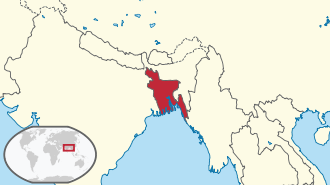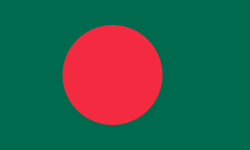
Back Бангладеш Abkhazian Bangladèsh ACE Бангладеш ADY Bangladesj Afrikaans Bangladesch ALS ባንግላዴሽ Amharic Bangladesh AMI Bangladesh AN Bængladesc ANG बांग्लादेश ANP
People's Republic of Bangladesh
| |
|---|---|
| Motto: Nationalism, secularism, socialism, and democracy | |
| Anthem: Amar Shonar Bangla My Golden Bengal | |
 | |
| Capital and largest city | Dhaka 23°42′N 90°21′E / 23.700°N 90.350°E |
| Official languages | Bengali |
| Common languages | Bengali (state language), English |
| Ethnic groups (1998) | 98% Bengali 2% other[1] |
| Religion | Islam |
| Demonym(s) | Bangladeshi |
| Government | Unitary parliamentary republic[2] |
| Mohammed Shahabuddin[3] | |
| Muhammad Yunus | |
• Speaker | Vacant |
| Syed Mahmud Hossain | |
| Legislature | Jatiya Sangsad |
| Independence from Pakistan | |
• Declared | 26 March 1971 |
• Current constitution | 4 November 1972[1] |
| Area | |
• Total | 148,460 km2 (57,320 sq mi) (93th) |
• Water (%) | 6.4 |
| Population | |
• 2018 estimate | 166,368,149a (8th) |
• Density | 964.42/km2 (2,497.8/sq mi) (9th a) |
| GDP (PPP) | 2018 estimate |
• Total | $758 billion (29th)[4] |
• Per capita | $4,600[4] |
| GDP (nominal) | 2018 estimate |
• Total | $284.2 billion[4] |
• Per capita | $1,740[4] |
| Gini (2005) | 33.2[5] medium |
| HDI (2018) | medium · 136th |
| Currency | Taka (BDT) |
| Time zone | UTC+6 (BST) |
| Driving side | left |
| Calling code | +880 |
| ISO 3166 code | BD |
| Internet TLD | .bd |
Website Official website | |
| |
Bangladesh, officially called the People's Republic of Bangladesh, is a country in South Asia. It is the eighth most crowded country in the world and one of the most tightly packed, with more than 170 million people living in an area of 148,460 square kilometres (57,320 sq mi). Bangladesh has land borders with India on the north, west, and east, and Myanmar on the southeast. In the south, it has a coastline along the Bay of Bengal. In the north, the Siliguri Corridor separates it from Bhutan and Nepal, and the Indian state of Sikkim separates it from China. Dhaka is the capital and biggest city. It is the center of politics, money, and culture. Chittagong is the second biggest city and the busiest port. Bengali is the official language. Islam is the official and biggest religion, and Bengali Muslims are the largest group of people in the country.
Bangladesh is part of the old region of Bengal, which was split during the Partition of British India in 1947. It became the eastern part of Pakistan. Long ago, Bengal was called Gangaridai and had powerful kingdoms before Islam. After 1204, Muslim rulers took control, and Bengal became important under the Bengal Sultanate and the Mughal Empire. Bengal was rich and important in trade and politics. The Battle of Plassey in 1757 started British rule, which lasted for 200 years. In 1905, Eastern Bengal and Assam were created, which later led to the making of Bangladesh. The All-India Muslim League was formed in Dhaka in 1906. In 1940, A. K. Fazlul Huq, the first Prime Minister of Bengal, suggested a separate Bengali Muslim land in the Lahore Resolution. The current border was set by the Radcliffe Line.
In 1947, East Bengal became the most crowded part of Pakistan and was renamed East Pakistan. Dhaka became its capital. The Bengali Language Movement in 1952, a military takeover in 1958, and the 1970 general election led to strong Bengali nationalism and demands for democracy. The Pakistan Army refused to give power to the Awami League, led by Sheikh Mujibur Rahman. This started the Bangladesh Liberation War in 1971. The Mukti Bahini fought and won, and the war included the genocide of Bangladeshis committed by the Pakistan Army in which the Bengali Hindus in particular were targeted. On 16 December 1971, Pakistan surrendered, and Bangladesh became independent after a 9-month war.
After the war, Sheikh Mujib became the leader. He was killed in 1975, and then Ziaur Rahman took power. He was also killed in 1981. In the 1980s, Hussain Muhammad Ershad ruled until he was removed in 1990 by mass protests. After 1990, Bangladesh’s politics was mostly controlled by a power struggle between Khaleda Zia and Sheikh Hasina, known as the "Battle of the Begums." In August 2024, students led protests that removed Hasina from power, and Muhammad Yunus became the interim leader.
Bangladesh is a country with a single government and follows the Westminster system. It has the second biggest economy in South Asia. It has the third biggest Muslim population in the world and the fifth most spoken first language. Bangladesh has the third biggest military in South Asia and sends the most soldiers to UN peacekeeping missions. The country has eight divisions, 64 districts, and 495 sub-districts. It has the world’s largest mangrove forest. But Bangladesh also has one of the biggest refugee populations and faces problems like corruption, political troubles, too many people, and climate change. Bangladesh has twice led the Climate Vulnerable Forum and is home to the BIMSTEC headquarters. It is a founding member of SAARC and also a member of the OIC and the Commonwealth of Nations.
- ↑ 1.0 1.1 Central Intelligence Agency (2011). "Bangladesh". The World Factbook. Langley, Virginia: Central Intelligence Agency. Archived from the original on 1 January 2021. Retrieved 5 October 2011.
- ↑ Constitution of Bangladesh Archived 2012-03-06 at the Wayback Machine, Part V, Chapter 1, Article 66; University of Minnesota, retrieved: 28 August 2010
- ↑ "Life Sketch of Mr. Md. Abdul Hamid". Office of the President of Bangladesh. Archived from the original on 13 March 2016. Retrieved 30 October 2016.
- ↑ 4.0 4.1 4.2 4.3 "Bangladesh". International Monetary Fund. Retrieved 20 April 2011.
- ↑ "Distribution of family income – Gini index". The World Factbook. CIA. Archived from the original on 13 June 2007. Retrieved 1 September 2009.
- ↑ "Human Development Report 2018. Human development index trends: Table G" (PDF). The United Nations. January 2010. Archived from the original (PDF) on 5 December 2010. Retrieved 14 July 2018.

